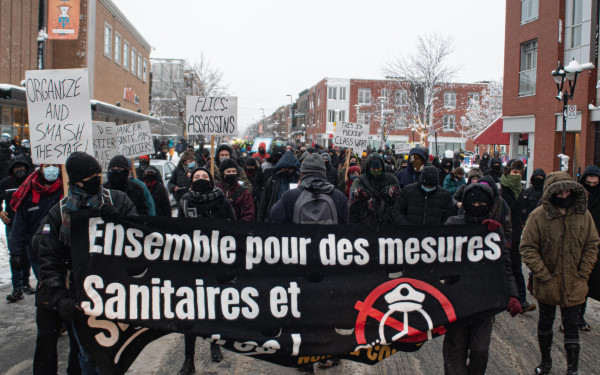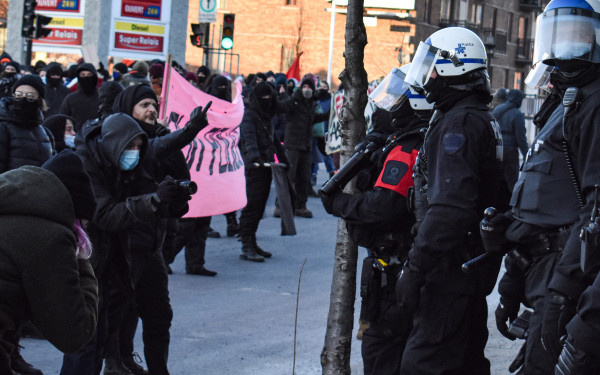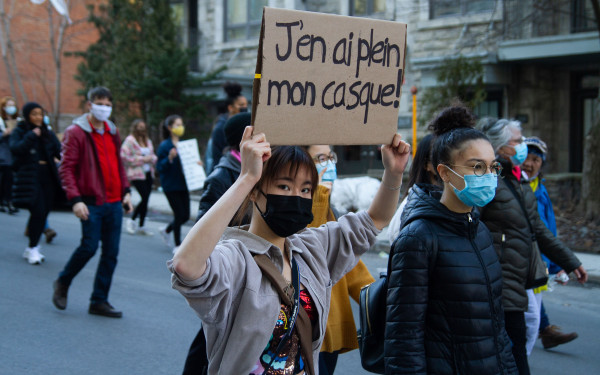Climate march calls for an end to systemic racism, the SPVM, corporate greed
Protesters demand climate justice, social reform, Indigenous rights
Hundreds gathered at Jeanne-Mance Park for this year's climate march to demand the Quebec government take action to stop climate change, and to bring awareness to the climate crisis and the mistreatment of People of Colour.
A member of the Coalition étudiante pour un virage environnemental et social, Extinction Rebellion, and a protest organizer, Shi Tao Zhang, claims holding this years' march was more important than ever.
"[I]t is during the pandemic, during public health emergencies, that the government will use the opportunity to pass laws that harm the environment and human rights," she said.
March 19, 2021, marks the third protest held since the record-breaking climate march in 2019. This year, though fewer gathered, the message remains the same; climate and social justice for all.
The CEVES organized the event, but other organizations were invited to speak. The Racial Justice Collective, Extinction Rebellion Youth group, Climate Justice Montreal, Debout pour la Dignité, and Solidarity Across Borders all participated in the event.
Their demands were marked by three clear points: carbon neutrality by 2030, recognition and support of the sovereignty of First Nations, and defunding the SPVM and reinvesting in the community.
The CEVES was joined by the Mashk Assi Collective, a First Nations group bringing attention to the climate crisis, Indigenous genocide, and systemic racism.
The event centred around the Quebec government's involvement in the GNL pipeline, as many protesters called for an end to the project. The march concluded by Hydro-Quebec’s downtown office, where the police presence rose.
“It is during the pandemic, during public health emergencies, that the government will use the opportunity to pass laws that harm the environment and human rights.” — Shi Tao Zhang
The GNL project—which began in 2014—promises to build a 750 km pipeline across Quebec in order to transport natural gas overseas. The project spans across 43 Quebec and five First Nations communities. According to an article by Equiterre Quebec, the project threatens the safety of those community rivers and though it creates jobs in the short term, the tourism and farming industries.
"We need to stop pipelines like the natural gas pipeline; there's a big mobilization around [GNL]," said Mike Paul Kuekuatsheu, a member of the Mashk Assi Collective and one of the speakers.
In a speech before the march, Kuekuatsheu denounced the federal government’s way of handling projects involving First Nations, like GNL. “We do not recognize these projects that are signed by the band councils which work for the state system,” he told a cheering crowd. “A state that represents the federal government, which does not represent an ancestral Aboriginal governance of the First Peoples.”
“True self-determination will be achieved by the Aboriginal people only and not by usurpation of chiefs,” he said.
Among the organizations present, socialists, communists, and nationalists also joined the activists. Most had differing opinions on how the government should handle the climate crisis, however, the general sentiment teetered around anti-capitalist, with many speakers citing over-consumption and greed as significant players in the planet’s destruction.
A heavy police presence followed the march as it trotted down Montreal streets. The overall feeling towards the police was hostile, as part of the protest called for the defunding of the SPVM.
The police were not invited according to Zhang, but she was not surprised they came. As a result, CEVES put in place measures to guarantee the safety of minorities. “We also have volunteers who will accompany the most vulnerable people,” she says. “Just to make sure everyone is safe.”
Orania, a protestor who preferred to only use her first name, claims there was no way around the police escort despite the uneasy feeling their presence brought.
“I honestly don't think they're protecting us. They're mostly just doing more harm,” she said. “But in demonstrations like these, you can't really avoid them.”
The feeling of unease and hostility surrounding the police was shared by most protestors who booed and chanted at them.
"Police are racist," a protester yells into a megaphone. “SPVM," the crowd answers.
According to the SPVM, no arrests were made, and no incidents were reported before, during or concerning the event.
With files from Mina Collin.





